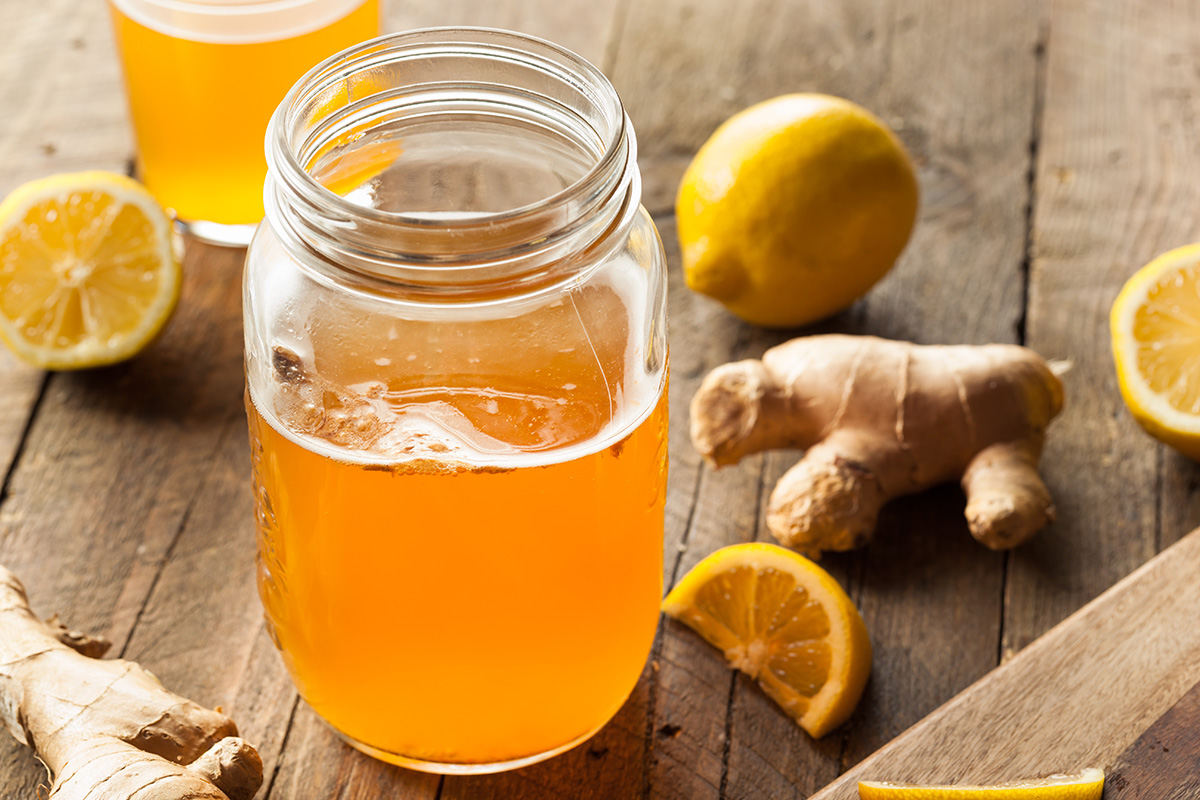Wellness Tips: Kombucha – Gut-Friendly Health Beverage…or Sugar-Laden Treat?
- by bonappetit
 Can you drink too much kombucha? Should I be worried about the sugar and caffeine content, or about consuming too many probiotics?
Can you drink too much kombucha? Should I be worried about the sugar and caffeine content, or about consuming too many probiotics?
The fermented beverage known as kombucha has taken the beverage industry by storm: sales rose 37 percent in 2017 (which is a lot compared to 1 percent growth seen in other non-alcoholic beverages). With new brands and flavors popping up nearly daily, you might wonder if you’re missing out if they aren’t part of your beverage rotation. The question is, can a daily kombucha habit ever be problematic?
Kombucha is a fermented tea traditionally brewed with black or green tea leaves, sugar, bacteria, yeast, and water. The sugar, along with live active bacteria, allows it to ferment, creating a SCOBY (symbiotic culture of bacteria and yeast), which turns the tea into a carbonated, vinegar-like tonic. The live culture SCOBY is then removed — and often reused as a starter for future brews. The liquid left behind is kombucha.
The fermentation process results in live bacterial cultures known as probiotics, or the beneficial bacteria that live in our digestive systems. These friendly bacteria play a role in gut health, immunity, and may even affect mood. However, a 16-ounce bottle of kombucha doesn’t actually provide that many probiotics — typically only a few million live bacteria are present at bottling (and likely less by the time it hits the shelves, or your lips) compared to about 1 billion found in a 6-ounce yogurt or the trillions we house naturally in our digestive systems.
If you’re new to fermented foods and drinks like kombucha, you may still want to start with small amounts; some people report digestive distress from probiotic foods and supplements, though typically at higher amounts. It’s also important to understand that most kombucha contains only one or two strains of bacteria, and we need a wide variety for gut health, so don’t rely on kombucha for all of your probiotic needs.
Because kombucha is made from black and green tea, it also contains small amounts of caffeine. A traditional brewed tea contains around 15 milligrams per serving, which is the typical amount per serving reported by most major brands of kombucha. The daily recommended maximum amount of caffeine is 400 mg, and the average cup of coffee contains around 100 mg, so unless you are highly sensitive to caffeine, it’s probably not something to worry too much about.
Sugar is where things get more concerning. The sugar content varies widely in popular kombucha brands, with most providing anywhere from 6 to 20 grams (or 2 to 5 teaspoons) of sugar per single-serve bottle. This means drinking two kombuchas a day would put you at or near the recommended limit for added sugar consumption by the American Heart Association, which is less than 6 teaspoons per day for women and 9 for men. One caveat:, according to one dietitian’s report, it’s difficult to know how much sugar is left after the fermentation process, so labels may be not be completely accurate.
So, can you go overboard on kombucha? While the probiotic content and caffeine levels are unlikely to cause health problems — even if you’re tossing back multiple bottles per day — the sugar content is definitely something to watch. As with any trending food or ingredient, there can be too much of a good thing, so limit your kombucha habit to a bottle per day, max, and make water or other unsweetened beverages your regular drink of choice.
At Bon Appétit, we know there’s a lot on your plate that you worry about. That’s why we have a team of registered dietitian nutritionists ready to answer your nutrition questions about which food choices will help you avoid unwanted pounds, work or study (and sleep!) better, and form long-lasting healthy eating habits. Email your questions and feedback to [email protected]